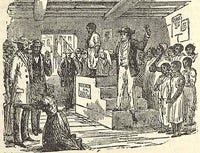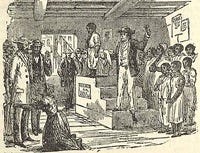Photo Credit: National Humanities Center
Issue #383 American History Tuesday, September 19, 2023
As we continue to struggle to save our admittedly imperfect Union from would-be authoritarians and dictators, we must realize that while our early presidents believed in all of the freedoms they espoused for white, male, Christian Americans, they had no problem enslaving Africans and committing genocide on Indigenous Nations.
Our first ten presidents were slave owners. Most of them owned slaves for economic reasons, although a few really felt that they were destined to rule over the non-Europeans in America.
Here is a comprehensive list of the Founding Fathers and presidents who were slaveholders, along with relevant information about their involvement in slavery:
1. George Washington (1789-1797): As the first President of the United States, Washington owned over 300 enslaved individuals. Despite his personal ownership of slaves, he expressed concerns about the institution and privately expressed his desire to see it abolished.
2. Thomas Jefferson (1801-1809): Jefferson, the principal author of the Declaration of Independence, owned around 600 slaves throughout his lifetime. He wrestled with the contradiction between his ownership of slaves and his belief in individual liberty, even calling slavery a "moral depravity" and a "hideous blot." Sally Hemmings, who bore Jefferson several children, was not his "mistress," she was a slave. Talk about "moral depravity."
3. James Madison (1809-1817): Madison, often referred to as the "Father of the Constitution," owned around 100 slaves on his Virginia plantation. He recognized the moral wrong of slavery but believed that a gradual approach was necessary for its abolition due to economic and social complexities.
4. James Monroe (1817-1825): Monroe owned around 75 slaves during his lifetime. While he expressed concerns about the institution of slavery, he did not take significant actions to challenge or dismantle it during his presidency.
5. Andrew Jackson (1829-1837): Jackson owned approximately 150 enslaved individuals on his plantation. He defended slavery as an essential part of the Southern economy and fiercely opposed any attempts to limit its expansion.
6. Martin Van Buren (1837-1841): Van Buren owned one slave during his lifetime. Although he did not actively support the abolitionist movement, he opposed the expansion of slavery into new territories.
7. William Henry Harrison (1841): Harrison did not own slaves himself, but his family owned slaves on their Virginia plantation.
8. John Tyler (1841-1845): Tyler owned around 70 slaves during his lifetime and actively defended the institution of slavery. He later became a staunch advocate for the secession of Southern states.
9. James K. Polk (1845-1849): Polk owned around 25 slaves throughout his life. He supported the expansion of slavery and sought to acquire additional slaveholding territories through the Mexican-American War.
10. Zachary Taylor (1849-1850): Taylor owned slaves on his Louisiana plantation. However, his personal views on slavery remain unclear, as he did not actively promote or defend the institution.
It is important to note that while some of these Founding Fathers and presidents expressed moral qualms about slavery, very few took significant action to challenge or dismantle the system during their time in office. The political compromises made during the founding era, such as the Three-Fifths Compromise and the Missouri Compromise, further perpetuated the institution of slavery.
It took a civil war to end the institution of slavery in the United States, although racism and discrimination continue unabated to this day.
We depend on you to help us to grow “We Are Speaking!”
We appreciate every one of our subscribers, but our paid subscribers help to finance our 7-day-a-week publishing schedule. Please subscribe for free or at a paid level.





Thank you for sharing this information. I was unaware there were so many slave owners. I was aware of the earliest presidents but not the later one. However, Andrew Jackson should not have surprised me. He was generally an a$$. What he did to the indigenous people was horrific.
It’s interesting to me that those who opposed it didn’t have a problem with owning them. As for Jefferson and his “mistress” - that’s a romantic notion that makes white people feel better.